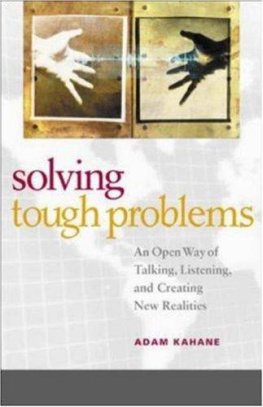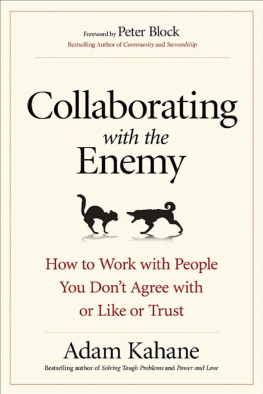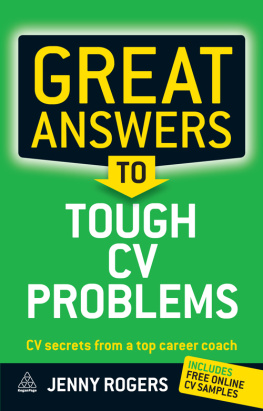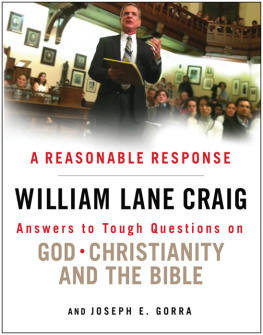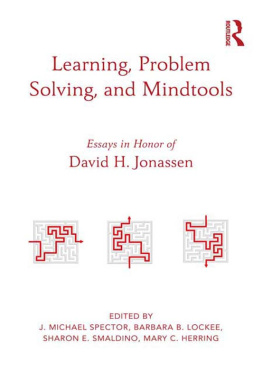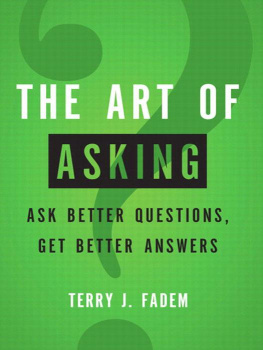Solving Tough ProblemsAn Open Way of Talking, Listening, and Creating New Realities
Adam Kahane
BERRETT-KOEHLER PUBLISHERS, INC.
San'Francisco
Copyright 2004 by Adam Kahane
All rights reserved. No part of this publication may be reproduced, distributed, or transmitted in any form or by any means, including photocopying, recording, or other electronic or mechanical methods, without the prior written permission of the publisher, except in the case of brief quotations embodied in critical reviews and certain other noncommercial uses permitted by copyright law. For permission requests, write to the publisher, addressed "Attention: Permissions Coordinator," at the address below.
Berrett-Koehler Publishers, Inc.
235 Montgomery Street, Suite 650
San Francisco, CA 94104-2916
Tel: (415) 288-0260 Fax: (415) 362-2512
www.bkconnection.com
Ordering Information
Quantity sales. Special discounts are available on quantity purchases by corporations, associations, and others. For details, contact the "Special Sales Department" at the Berrett-Koehler address above.
Individual sales. Berrett-Koehler publications are available through most bookstores. They can also be ordered directly from Berrett-Koehler: Tel: (800) 929-2929; Fax: (802) 864-7626; www.bkconnection.com
Orders for college textbook/course adoption use. Please contact Berrett-Koehler: Tel: (800) 929-2929; Fax: (802) 864-7626.
Orders by U.S. trade bookstores and wholesalers. Please contact Publishers Group West, 1700 Fourth Street, Berkeley, CA 94710. Tel: (510) 528-1444; Fax: (510) 528-3444.
Berrett-Koehler and the BK logo are registered trademarks of Berrett-Koehler Publishers, Inc.
Printed in the United States of America
Berrett-Koehler books are printed on long-lasting acid-free paper. When it is available, we choose paper that has been manufactured by environmentally responsible processes. These may include using trees grown in sustainable forests, incorporating recycled paper, minimizing chlorine in bleaching, or recycling the energy produced at the paper mill.
Library of Congress Cataloging-in-Publication Data
Kahane, Adam. Solving tough problems: an open way of talking, listening, and creatingnew realities / Adam Kahane. p. cm. Includes bibliographical references and index.
ISBN 1-57675-293-3
1. Conflict management. 2. Problem solving. 3. Communication. I. Title.
HM1126.K34 2004
303.6'9dc 22
2004046130
First Edition
09 08 07 06 05 04 10 9 8 7 6 5 4 3 2 1
Interior Design: Laura Lind Design
Copy Editor: Judith Brown
Production: Linda Jupiter, Jupiter Productions
Proofreader: Henrietta Bensussen
Indexer: Medea Minnich
To my family
About the Author
Adam kahane is a founding partner (with Joseph Jaworski and Bill O'Brien) of Generon Consulting, and of the Global Leadership Initiative. He is a leading designer and facilitator of processes through which business, government, and civil society leaders can work together to solve their toughest, most complex problems. He has worked in this area in more than fifty countries, in every part of the world, with executives and politicians, generals and guerrillas, civil servants and trade unionists, community activists and United Nations officials, journalists and clergy, academics and artists.
During the early 1990s, Adam was head of Social, Political, Economic and Technological Scenarios for Royal Dutch/Shell in London. Previously he held strategy and research positions with Pacific Gas and Electric Company (San Francisco), the Organisation for Economic Cooperation and Development (Paris), the International Institute for Applied Systems Analysis (Vienna), the Institute for Energy Economics (Tokyo), and the Universities of Toronto, British Columbia, California, and the Western Cape.
In 1991 and 1992, Adam facilitated the Mont Fleur Scenario Project, in which a diverse group of South Africans worked together to effect the transition to democracy. Since then he has led many such seminal multi-stakeholder dialogue-and-action processes throughout the world. He was one of the sixteen outstanding individuals featured in Fast Company's first annual "Who's Fast" and is a member of the Commission on Globalisation, the Aspen Institute's Business Leaders' Dialogue, the Society for Organizational Learning, and Global Business Network.
Adam has a B.Sc. in Physics (First Class Honors) from McGill University (Montreal), an M.A. in Energy and Resource Economics from the University of California (Berkeley), and an M.A. in Applied Behavioral Science from Bastyr University (Seattle). He has also studied negotiation at Harvard Law School and cello performance at Institut Marguerite-Bourgeoys.
Originally from Montreal, he lives in Boston and Cape Town with his wife Dorothy and their family.
Generon Consulting
900 Cummings Center, Suite 312U
Beverly, Massachusetts 01915
United States of America
www.generonconsulting.com
Acknowledgments
I would like to acknowledge the kind help I have received in writing this book: from my colleagues, especially Joseph Jaworski, Otto Scharmer, Susan Taylor, and the late Bill O'Brien; from my readers and editors, especially Valerie Andrews, Janet Coleman, Elena Diez Pinto, Kees van der Heijden, Betty Sue Flowers, David Kahane, Art Kleiner, Steve Piersanti, Bettye Pruitt, and Peter Senge; and from my family, especially Dorothy.
Foreword by Peter Senge
Increasingly we face issues for which hierarchical authority is inadequate. No CEO can transform a company's ability to innovate, or single-handedly create a values-based culture. No country president can resolve intractable political stalemates that stand in the way of national development. It is painfully apparent that even the most powerful political leaders and global institutions are powerless in the face of issues like climate change or the growing gap between rich and poor that, if left unaddressed, will undermine the future we leave our children and grandchildren.
Faced with this reality, we see everywhere a growing sense of powerlessness and an increasing reliance on force. The former reflects awareness that the big issues are generally getting worse, not better; the latter, a desperate response to this awareness. Few of us do not shudder at the prospect of a continuation of today's escalating reliance on force. Adam Kahane's book poses a third option: a transformation in our ability to talk, think, and act together. I am convinced this is the only reliable path forward, not only for hierarchical leaders but for all of usas parents, citizens, and people at all levels in organizationsseeking to contribute to meaningful change.
While this third option is commonly dismissed as idealistic and unrealistic, Adam's belief in this possibility has been forged in the fire of some of the world's most complex and conflicted situations. As a young scenario planner from Shell, he found himself in 1991 helping formerly outlawed black political party leaders in South Africa develop strategies to guide their divided country. The problem was that they saw the world differently from one another and very differently from the white minority with whom they had to work. Remarkably, in little more than a year, this Mont Fleur scenario process resulted in a meaningful consensus on many of the country's core challenges and a way of talking and working together that united a broad cross section of the country. South Africa still faces immense challenges, but it is hard to imagine the country's transition to stable multiracial democracy without this process and others like it.

